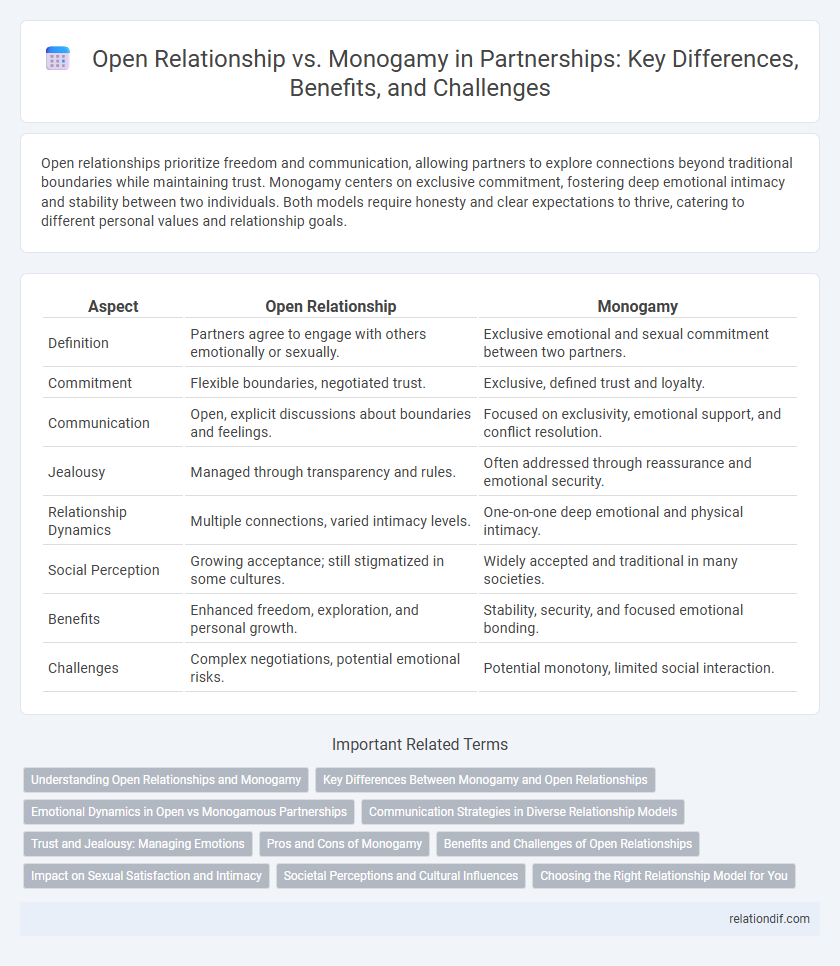Open relationships prioritize freedom and communication, allowing partners to explore connections beyond traditional boundaries while maintaining trust. Monogamy centers on exclusive commitment, fostering deep emotional intimacy and stability between two individuals. Both models require honesty and clear expectations to thrive, catering to different personal values and relationship goals.
Table of Comparison
| Aspect | Open Relationship | Monogamy |
|---|---|---|
| Definition | Partners agree to engage with others emotionally or sexually. | Exclusive emotional and sexual commitment between two partners. |
| Commitment | Flexible boundaries, negotiated trust. | Exclusive, defined trust and loyalty. |
| Communication | Open, explicit discussions about boundaries and feelings. | Focused on exclusivity, emotional support, and conflict resolution. |
| Jealousy | Managed through transparency and rules. | Often addressed through reassurance and emotional security. |
| Relationship Dynamics | Multiple connections, varied intimacy levels. | One-on-one deep emotional and physical intimacy. |
| Social Perception | Growing acceptance; still stigmatized in some cultures. | Widely accepted and traditional in many societies. |
| Benefits | Enhanced freedom, exploration, and personal growth. | Stability, security, and focused emotional bonding. |
| Challenges | Complex negotiations, potential emotional risks. | Potential monotony, limited social interaction. |
Understanding Open Relationships and Monogamy
Open relationships prioritize consensual non-monogamy, allowing partners to engage emotionally or physically with others, while monogamy centers on exclusive commitment between two individuals. Understanding the dynamics of open relationships involves recognizing communication, boundaries, and trust as foundational elements distinct from traditional monogamous structures. Studies emphasize that successful partnerships, whether open or monogamous, rely on mutual respect, transparency, and alignment of values to foster relationship satisfaction.
Key Differences Between Monogamy and Open Relationships
Monogamy involves exclusive romantic and sexual commitment between two partners, emphasizing emotional fidelity and a singular bond. Open relationships allow consensual romantic or sexual involvement with multiple people, prioritizing transparency and negotiated boundaries. Key differences include exclusivity, communication styles, jealousy management, and individual definitions of commitment.
Emotional Dynamics in Open vs Monogamous Partnerships
Emotional dynamics in open relationships often involve navigating complex feelings such as jealousy, freedom, and trust, requiring high levels of communication and emotional intelligence. In monogamous partnerships, emotional intimacy tends to deepen through exclusivity, fostering stability and a singular focus on a shared life experience. Understanding these differing emotional frameworks helps partners align their expectations and build stronger relational foundations.
Communication Strategies in Diverse Relationship Models
Effective communication strategies in diverse relationship models, such as open relationships and monogamy, prioritize honesty, transparency, and regular check-ins to align expectations and boundaries. Couples practicing non-monogamy often implement explicit agreements and utilize conflict resolution techniques to navigate jealousy and maintain trust. In monogamous partnerships, open dialogue about needs and emotional experiences fosters security and strengthens the emotional bond.
Trust and Jealousy: Managing Emotions
Trust forms the foundation in both open relationships and monogamy, playing a crucial role in managing jealousy and emotional stability. Open relationships require explicit communication and agreed boundaries to navigate feelings of jealousy effectively, whereas monogamy often relies on exclusive commitment to minimize these challenges. Both relationship styles demand emotional intelligence and transparency to foster mutual trust and handle insecurities constructively.
Pros and Cons of Monogamy
Monogamy offers emotional stability and deep intimacy by fostering exclusive commitment between partners, reducing risks of jealousy and complex dynamics common in open relationships. However, it may limit personal freedom and exploration, sometimes leading to unmet individual desires or stagnation if communication is lacking. Balancing trust and transparency is essential to maintain satisfaction and address potential challenges inherent in monogamous partnerships.
Benefits and Challenges of Open Relationships
Open relationships offer increased emotional freedom and opportunities for personal growth by allowing partners to explore connections beyond traditional monogamy. Challenges include managing jealousy, establishing clear communication, and maintaining trust to prevent misunderstandings. The benefits of openness can enhance intimacy, but require consistent effort to navigate complexities inherent in non-monogamous dynamics.
Impact on Sexual Satisfaction and Intimacy
Open relationships often foster higher sexual satisfaction by allowing partners to explore diverse experiences while maintaining emotional intimacy through honesty and communication. Monogamous partnerships typically deepen intimacy due to exclusive emotional and sexual bonding, which can enhance trust and long-term connection. Research indicates that sexual satisfaction in both relationship styles depends significantly on alignment of expectations and mutual understanding.
Societal Perceptions and Cultural Influences
Societal perceptions of open relationships often reflect cultural norms that prioritize monogamy as the ideal partnership model, shaping public attitudes and acceptance levels. Cultural influences, including religion, media representation, and traditional family values, significantly impact how open relationships are viewed and practiced within different communities. Research indicates that societies with progressive views on individuality and freedom tend to exhibit greater acceptance of open relationships compared to those with conservative or collectivist orientations favoring monogamy.
Choosing the Right Relationship Model for You
Choosing the right relationship model involves understanding personal values, emotional needs, and communication styles. Open relationships offer flexibility and autonomy, promoting honest conversations about boundaries and trust, while monogamy emphasizes exclusive emotional and physical commitment. Assessing compatibility with partners and reflecting on long-term goals helps determine the most fulfilling and sustainable relationship dynamic.
open relationship vs monogamy Infographic

 relationdif.com
relationdif.com